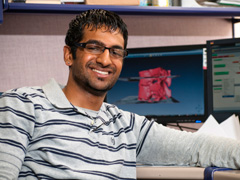The Las Vegas Story
By Jim Oldfield
Las Vegas hosted the 55th annual meeting of the Orthopaedic Research Society in February 2009, and for Devin Singh, the "capital of second chances" offered up a first.
"I was finally able to see, on the international stage, what other people are doing and how it relates to my work," says Singh, a doctoral student in the discipline of clinical integrative biology at Sunnybrook Research Institute (SRI) and the University of Toronto's Institute of Biomaterials and Biomedical Engineering.
Singh, co-supervised by Dr. Cari Whyne, director of the Holland musculoskeletal research program at SRI and an associate professor at U of T, and Dr. Howard Ginsberg, a neurosurgeon at St. Michael's Hospital, is designing a spinal implant for patients with vertebral instability. The project has two main components: prototyping and fabrication, and quantification (measuring the shape and dimensions) of the posterior spine. The goal is to fuse the spine (permanently connecting two or more vertebrae) while preserving its natural contour, thereby improving implant efficacy.
Trainee Travel Award
Application form: download (PDF, 80 KB)
Amount: up to $1,000
Eligibility:
Trainee must:
- present their research at a national or international conference;
- be a full-time student or postdoctoral fellow;
- not have a travel award with his or her scholarship or fellowship.
The trainee's supervisor is eligible for one award per student biannually (July 1 to December 31 and January 1 to June 30), and must hold an appointment at SRI.
The conference—which Singh attended courtesy of SRI's Trainee Travel Award Program, which reimburses eligible students and postdoctoral fellows for expenses related to presenting at national or international meetings—offered presentations, symposia and posters on both areas of Singh's project, along with explorations of biomaterials, cellular biology and regenerative medicine.
Singh found the computational imaging research on spinal form and structure most pertinent to his biomechanics work. "It was encouraging, because for a while it seemed I was the only one doing this work, but now I know there are other people out there. It's motivation to keep going, and makes my project seem more relevant."
Singh presented a poster on his project, in which he has developed an algorithm to automate three-dimensional reconstructions and dimensional analysis of computed tomography scans of the spine. Manual image-based measurements, in contrast, are prone to observer error and laborious; the algorithm eliminates inaccuracy and allows hundreds of images to be assessed rapidly.
It's an exciting time to be in the field, says Singh, because ideas for implants to improve spinal stability that have been around for two decades are now being realized, thanks largely to new materials and fabrication techniques. The resulting flexibility has spurred more creative biomechanical approaches, and renewed interest in research to improve spinal quantification, particularly the posterior aspects. Techniques for biomechanical testing and measurement of the spinous processes and laminae—areas of the posterior spine, which, as potential implant sites, are of special interest in Whyne's lab—were on display in Las Vegas; Singh hadn't seen focused work in that area since a surge of interest in the late '90s.
The conference overlapped with the American Academy of Orthopaedic Surgeons' annual meeting; of note for Singh was that meeting's extensive product show, in which medical device companies displayed their latest surgical technologies. Singh found the interaction among industry representatives and clinicians highly applicable to his clinical work with Ginsberg.
"It's nice to see the research side of things, but the overlap with the clinicians allowed me to see some of the industry innovation as well," says Singh. "The conference was really relevant to all aspects of my research."
For more information on SRI's trainee travel award, download the Trainee Travel Award information and application form (PDF, 80 KB).
PDF / View full media release »


